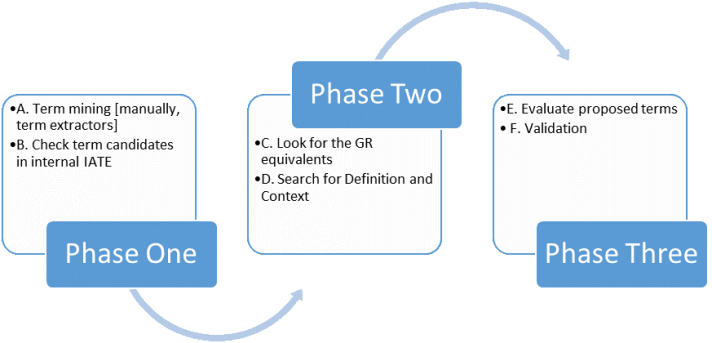
From 2013 our Master Students are introduced to Terminology Management through a special course delivered during their third semester of studies.
After the completion of this course, combining both theoretical and practical aspects of Terminology Management in Translation, Master Students can opt for a terminology project as a Master thesis. During these years, the vast majority of our students had the opportunity to cooperate with the Terminology Coordination Unit of the European Parliament (TermCoord), in order to contribute to the IATE term-base with well-documented and reliable terms in the Greek language[1]. These terminology projects include different domains such as:
Our goal today is to demonstrate the benefits of such EU projects to EMT Master Students in acquiring multiple competences - not only related to terminology – as it will be explained. For this purpose, we are going to briefly present the methodology of these projects and then discuss the competences involved in this learning process.
A terminology project starts with the proposal by TermCoord for a domain in which documented and reliable terminology is needed in the Greek IATE. Then, a number of authentic textual resources are selected and different corpora are created and processed by the use of Sketch Engine. After term extraction is completed, a solid definition and context in both English and Greek is provided for each term. Furthermore, the conceptual relations existing among the terms are also examined. Finally, results are discussed with experts in the field and verified by them.
A standard workflow of a terminology project is here depicted in Figure 1:
According to EMT Competence Framework, translator education and training at Master’s degree level should provide competences to students in five main areas, including: 1) language and culture; 2) translation; 3) technology; 4) personal and interpersonal; 5) service provision. As explained in the Framework (2017, p. 5), “within each of these areas, a number of skills are deemed to be essential or important within the context of a Master’s degree in translation. […] the five areas defined should be considered as complementary and equally important in providing the translation service, which is the ultimate goal of the translation process.”
If we compare the competences acquired by our Master Students throughout the IATE terminology project with the competences described in this reference document, we observe that the majority of areas are included. These projects boost especially the development of the following skills, as expressed in the Framework:
- Evaluate the relevance and reliability of information sources with regard to translation [here terminology] needs.
- Acquire, develop and use thematic and domain-specific knowledge relevant to translation [here terminology] needs (mastering systems of concepts, methods of reasoning, presentation standards, terminology and phraseology, specialised sources etc.).
- Understand and implement quality control strategies, using appropriate tools and techniques.
- Use the most relevant IT applications, including the full range of office software, and adapt rapidly to new tools and IT resources.
- Make effective use of search engines, corpus-based tools, text analysis tools […].
- Plan and manage time, stress and workload.
- Comply with deadlines, instructions and specifications.
- Work in a team, including, where appropriate, in virtual, multicultural and multilingual environments, using current communication technologies.
Furthermore, we consider especially useful the cooperation of our students with experts from different specialized domains, as they acquire networking techniques, interview skills, and learn inside information in the fields involved.
Finally, a very important asset in this educational process is the partnership with an EU institution, such as TermCoord, providing students a multilingual and multicultural environment of work, a high quality framework and a firm guidance from experienced terminologists.
As a conclusion, we could assert that this kind of activity is very challenging for both students and trainers involved. Moreover, benefits can outweigh the eventual drawbacks of organization and coordination of such projects. In our ever changing world, we believe that real life projects help students to better integrate into translation market, teaching them to work in teams and offering them the opportunity to gain hands-on experience.
[1] For further information, see: https://termcoord.eu/cooperation-with-universities-on-terminology-projects/
Details
- Publication date
- 31 October 2020
- Language
- Dutch
- English
- Italian
- Latvian
- EMT Category
- Translation competences

